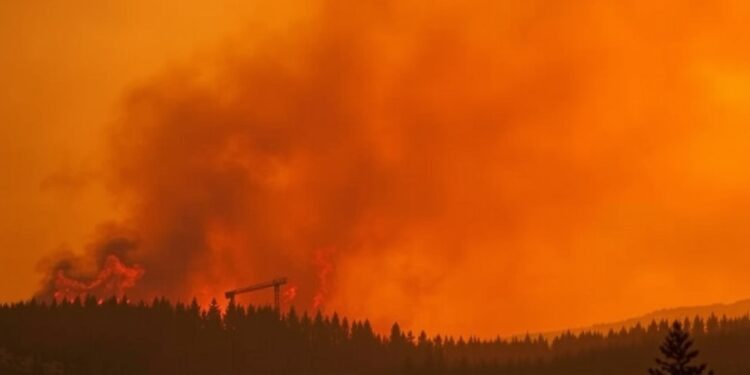The environmental landscape in the United States has undergone significant changes in recent decades, particularly regarding air quality and pollution sources. While emissions from established industrial sources have generally declined, wildland fires have emerged as a formidable contributor to public health concerns. A recent comprehensive study from researchers at Carnegie Mellon University shines a light on an alarming trend—smoke from wildfires and prescribed burns is responsible for untold health ramifications, amounting to $200 billion in health damages in 2017 alone. This staggering figure is compounded by the loss of approximately 20,000 lives attributed to this grievous pollutant.
The repercussions of wildfire smoke have a particularly devastating effect on senior citizens, who are often the most vulnerable demographic. The findings reveal an unsettling reality: among the populations impacted, Native American and Black communities suffer disproportionately higher rates of health damage on a per capita basis. This demographic disparity necessitates a critical examination of environmental policies and public health strategies that address the unequal burden borne by marginalized populations.
The research, detailed in the journal Communications Earth & Environment, underlines that while many studies have previously linked fire smoke to increased morbidity and mortality risks, the intrinsic social costs associated with these emissions are only now being fully explored. Professor Nicholas Muller, a coauthor of the study and an expert in economics, engineering, and public policy, articulated a growing need for greater understanding of these social costs amidst a backdrop of changing environmental conditions. The study utilized an integrated assessment model to gauge the extensive damages inflicted by ambient PM2.5, a harmful particulate matter released during wildfires and prescribed burns, across various regions in the contiguous United States during 2017.
The financial and human losses associated with fire smoke are staggering and cannot be understated. The damages resulting from fire smoke accounted for more than $200 billion in 2017—a significant 17% of total health damages across all emission sources recorded in the contiguous United States. Approximately 20,000 premature deaths correspond to this level of pollution, diverging evenly between smoke attributable to ongoing wildfires and that from prescribed burns, which are often conducted with the intention of preventing uncontrolled wildfires.
Geographically, nearly half of the smoke-related damage occurred as a result of wildfires, particularly concentrated in the western United States, while the other half primarily derived from prescribed burns located predominantly in the Southeast. Such findings not only illuminate the geographical disparities inherent in fire-related exposure but also reflect a broader trend involving community vulnerability. The research discovered that socio-economic factors play a significant role in exposure levels and subsequent susceptibility to health risks. This correlation underscores the intertwined nature of socio-economic status and health outcomes in the context of environmental injustices.
Senior citizens, though only constituting 16% of the overall population, bore an astounding 75% of the associated health damages, reinforcing the notion that age exacerbates vulnerability to pollution and its effects. However, the findings take an even more concerning turn when the data is parsed through the lenses of race and ethnicity. Native American and Black communities experience heightened damages relative to their population sizes, emphasizing the need for targeted public health interventions.
This research reveals the weighty burdens of smoke exposure, generating calls for proactive measures by local, state, and national decision-makers. Graduate student Luke Dennin, who led the study, asserted the need for comprehensive strategies to address this pressing environmental concern, particularly for those communities that have historically borne the brunt of environmental hazards. Among the recommendations put forth by the researchers is the expansion of real-time air quality monitoring. This enhancement should involve local outreach efforts, utilizing trusted community leaders to disseminate information effectively, especially in regions susceptible to wildfires and smoke exposure.
In parallel, the study advocates for investments in indoor air quality technologies that could mitigate the adverse effects of smoke, establishing clean air spaces accessible to the public, particularly in under-resourced areas such as senior centers. This holistic approach aims to foster resilience against health risks arising from wildfire smoke events. Another vital recommendation is the distribution of respiratory protection, especially N95 masks, via well-coordinated systems to shield populations who may lack the means or infrastructure to secure safety during smoke episodes—such as outdoor workers and individuals without safe indoor spaces.
The implications of this research extend beyond the immediate health costs, influencing future policy proposals and community planning initiatives. Policymakers are urged to recognize the critical intersections between environmental health and social equity. As wildfires continue to pose significant challenges in terms of air quality, addressing the disparities faced by vulnerable populations becomes imperative for creating fair and just environmental policies.
Finally, the financial backing for this pivotal study was made possible through collaboration between entities such as the U.S. Department of Energy’s National Energy Technology Laboratory, the National Science Foundation, and the Heinz Endowments. Their support has facilitated groundbreaking research that not only amplifies the conversation surrounding air quality and health but also underscores the need for a proactive, informed approach to dealing with the ever-growing threat of environmental pollutants.
In conclusion, the urgent findings presented in this study highlight an environmental and public health crisis that requires our collective attention and action. The disproportionate health effects faced by certain demographics should galvanize both the public and policymakers to prioritize strategies that provide equitable protection against wildfire smoke, ultimately fostering healthier environments for all populations.
Subject of Research: Health impacts of wildfire and prescribed burn smoke
Article Title: Socially vulnerable communities face disproportionate exposure and susceptibility to U.S. wildfire and prescribed burn smoke
News Publication Date: 8-Mar-2025
Web References: Carnegie Mellon University Tepper School of Business
References: Communications Earth & Environment
Image Credits: Not applicable
Keywords: Wildfires, smoke, environmental health, air quality, health economics, mortality rates, community vulnerability, air pollution, PM2.5, environmental policy.




